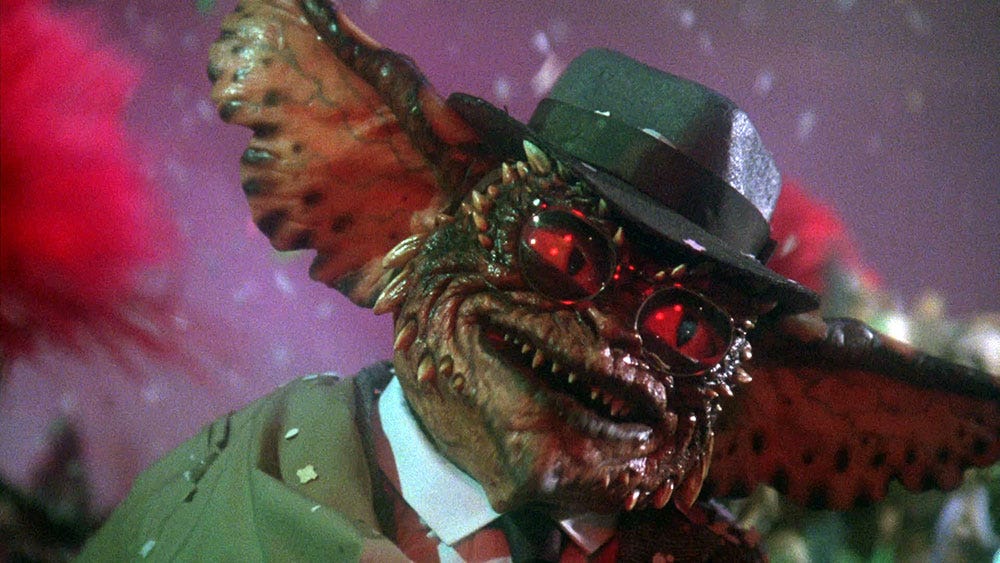Ciao a chairde,
The Brain Gremlin has fascinated me for over six months now. I saw Gremlins 2: The New Batch just before Christmas, and his presence and charisma truly grabbed me. I have not yet investigated the original Gremlins film, but I have sporadically rewatched every Brain Gremlin clip I can get my hands on.
For the uninitiated, the Brain Gremlin is one of the primary antagonists of Gremlins 2. Originally a gremlin like any other — a mischievous, violent little goblin — he drinks a substance called the Brain Hormone. Soon enough, he develops both mentally and sartorially into an elegant public intellectual. My spark of connection with him probably started there: I am nothing if not a well-dressed gremlin who gets paid for expressing opinions.
His accent is a further source of allure. The Brain Gremlin’s American voice actor Tony Randall created what may have simply been a wobbly attempt at an RP accent, but I prefer to think of it as a deliberately ambiguous fusion: part posh English, part Australian, governed overwhelmingly by vibes. ‘Civiloooiiisation’, he drawls in his first televised interview. He expands that what the Gremlins are aiming for, as the species develops, is: ‘The niceties, Fred. The fine points: diplomacy, compassion, standards, manners, tradition ... that's what we're reaching toward. Oh, we may stumble along the way, but civilisation, yes. The Geneva Convention, chamber music, Susan Sontag.’ Later in the scene comes possibly my favourite one-liner of all time: ‘Now, bear in mind, none of us has been in New York before. There are the Broadway shows — we'll have to find out how to get tickets. There's also a lot of street crime, but I believe we can watch that for free.’
The Brain Gremlin’s motives for giving the interview are never fully developed. He’s not making a full-throttle attempt to convince his audience of the species’ quest for culture; mid-monologue, he shoots a lesser gremlin who’s wandered onstage and asides: ‘Now, was that civilised? No, clearly not. Fun, but in no sense civilised.’ I think he’s just enjoying the bit. He wants pushback from his straight man, the presenter, so that his own shtick will benefit from having a foil. He’s undoubtedly a megalomaniac, but that’s not to say he lacks a sense of humour. (A one-line summary that would work for my own obituary.)
I often instinctively side with villains. Some of it is an autism thing: when you’re constantly having malice attributed to your direct communication style, there’s vicarious relief in identifying with characters who are genuinely wicked and loving it. The very conditional pedestal society grants to Brain Autistics is also fairly similar to the Brain Gremlin’s. (I wrote about the Brain Autistics thing here, if you’re interested. The nice thing, once you’ve written one big article about a point you’re tired of making, is that you can just link to that piece for the rest of time.)
Anyway, Brain Gremlin abú. Apparently Tim Curry was considered for his voice? But the Brain Gremlin is plenty camp as he is.
*
I’m also deeply into Season 2 of Ros na Rún, the Irish-language soap opera that I have been watching from its very first episode in 1996. So far, I love how the women are written; there’s extraordinary depth to them for what is essentially an Irish-speaking telenovela. They aren’t always enlightened feminists from a 2025 lens, but they have interiority and agency in the sense that we understand why they make the decisions they do.
Angela and Rita are two fascinating case studies of a still depressingly common phenomenon: women closing rank with the show’s many dubious men because their own comfort matters more to them than their principles. Angela does effectively the same thing to Rita that Rita already did to Ali: not necessarily disbelieving the woman, but protecting the man anyway. Put in the whistleblower position, Rita is outraged and horrified that a fellow woman won’t confirm what they both know to be true. But Rita is just as quick to silence Ali herself when her own patriarchal allegiances come under threat.
I much prefer the scheming Caitríona, who is by no means a girls’ girl, but who at least doesn’t fall over herself to shield men from the consequences of their actions. The first time her boyfriends do anything truly unacceptable to her, she fires them and that’s that. Decades before the phrase Dump Him had entered our collective lexicon, Caitríona Ní Loideáin had it down.
I’m also enamoured of Tom and Jack, and the levity with which their relationship is handled; this 90s show sets a standard that many 2020s ones could learn from in terms of acknowledging homophobia without turning it into trauma porn. ‘Tá daoine aeracha ag troid ar son na cearta a bheith ina dtuismitheoirí’, Tom jokingly offers as a silver lining when they get dumped with their sister’s baby: gay people are fighting for the right to be parents. The emotionally intelligent way they dissect everyone else’s relationships in the town, without necessarily bringing that wisdom back to their own, feels true to life: queer people are often socialised to be hyper-sensitive to others’ communication without that insight necessarily carrying over to introspective awareness. Growing up closeted involves obsessively gauging social feedback while never daring to delve into one’s own psyche. (Also, though, we do just love to gossip.)
There’s probably a longread – or even an essay collection – in me about Ros na Rún, but I have much watching still to do.
*
That's it for now. I hope yiz are braving the heat. Even in Dublin, I’m finding it altogether excessive.
Beir bua,
N


